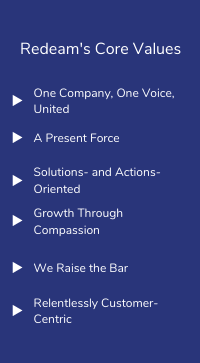Business How-To 2020: Transforming, Surviving, and Thriving
Even prior to COVID, the 18 months leading up to 2020 were both tumultuous and transformative times for Redeam. The founding CEO was replaced by an outsider by Redeam’s Board of Directors. This new CEO, Melanie Meador, brought with her a new, bigger vision for the direction of the company that required new technology product development, new customer success and sales teams, and new additions to the engineering team. In less than a year, the company headcount quadrupled in size. Navigating this pace of change was not without its challenges, but one standout factor – its culture – became the true bell weather of how Redeam would withstand what was to come. A recent piece published by the consulting firm McKinsey, “The Path To True Transformation,” reminded us of just how far we’ve come and how we’ve done it. So, we’ve decided to reflect upon our own transformation and past challenges to be able to share and hopefully inspire other businesses currently struggling during our difficult pandemic times. This is our story.
Building the Right Team
When Melanie Meador joined Redeam, she brought several key advantages with her: past deep experience in creating the connectivity solutions for the hotel industry over a 20 year travel career; leadership and team-building experience at great brand companies; product evolution passion; and vision for Redeam’s future and role in transforming an long-standing analog industry. To realize this future, she knew she would also have to transform the company.

As a female CEO, Melanie also felt strongly about having a workforce that was diverse, populated by the commonly under-represented in technology companies, such as women, minorities, and older workers. So well did Redeam achieve this workforce vision, the Wall Street Journal’s “CIO Journal” featured Redeam in a follow-up story about age bias in hi-tech. There were other aspects of company culture that Melanie sought to create…
- Clear company Vision, Mission and Values
- Two-way trust between the talent she hired and the leaders in charge so that through listening and leveraging, expertise could be maximized to help define the path forward.
Melanie also intentionally sought out team leaders who were better and smarter than her at their respective jobs – with these kinds of executives leading in various roles, Melanie had the confidence to focus on her core strengths: Seeing the vision through to fruition, building a high performing and high engagement culture, solidifying their market positioning and product fit, selling it to investors and key customers, and building and maintaining a successful company.
- Facing hard team-refining decisions. During the transformation process, it’s critical to look at each employee and make a determination if they fit into the newly-defined vision and culture. Hard questions have to be asked: Do they have the skill sets needed? Can they align with the new culture? Are there development opportunities? If the answer to some or all of those questions is no, the matter cannot be ignored. The leader has to address the problem in order to ensure building the best team to move the vision forward.
Of course, implementing a new vision and quickly adding to a company headcount under new leadership nearly all at the same time also comes with growing pains. As the company changed, it did experience limited and expected turnover. In the meantime, those joining the company for the first time had to forge bonds quickly and sometimes from great distances apart. To expedite bond-building, Redeam used tactics ranging from online communications platforms, to all hands, in-person team building activities, to a motivating recognition and reward platform. Employees were surveyed quarterly to gauge and direct the transformation’s impact on the culture. In a relatively quick time, as the changes took effect and hiring and turnover settled down, Redeam’s team really began to gel and its culture materialized.
Selling the Vision
For us, it was clear that treating the symptom (paper vouchers) was never going to cure the disease (lack of digitization in our sector). We came to that conclusion by analyzing the industry, the challenges of our partners and potential partners, and identifying a scalable enterprise solution that would work, that innovatively solved the disease. Once we came to that conclusion, we tested and validated the product concept and fit in-market. Our findings made it very clear that we needed to move in this direction. Next up: Building the best-in-class team and selling the pivot to our Investors and Board of Directors.
Investors want to know very clearly what problem you are trying to solve, what the size of the market opportunity is, validation on product market fit, strategy for addressing TAM (Total Available Market) and expected timelines for revenue achievement. Before presenting to the Board, current investors, or potential investors, it’s very important to have the story buttoned up and to make sure it’s clearly understood. Investors are going to ask hard questions and if you are not prepared to answer them, it will be very difficult to get their buy-in. It was essential for us to take the necessary time and steps required to build and communicate our compelling go to market plan.
Surviving
Redeam, under its new leadership and with its new solutions successfully launched with the world’s most iconic attraction brand, truly seemed to be hitting its stride. And then the global pandemic forced the closure of all Redeam’s major customers. In fact, all of travel came to a screeching halt. To say Redeam faced unprecedented circumstances was an understatement. It required swift and difficult action, particularly because Redeam was still an early stage company burning through cash even under the best of circumstances.
Cost-cutting measures were implemented immediately. Of course, all travel for sales and events was immediately terminated. Streamlining of all functional areas ensued. Since the headquarter office was closed and everyone was already working from home as a result of the lock-down, Redeam cancelled its lease agreement, moving to a fully remote workforce. Keeping the team motivated and engaged from afar led to some creative solutions. Weekly all-company calls took place by video conference and were accompanied by fun themes.
Initially, Redeam refrained from furloughing any employees in the hopes that the lock-down wouldn’t be long-lived, but as more time went by, it became clear that headcount would need to be reduced, a fate suffered by travel companies worldwide. Despite this inevitable and unwelcome decision, Melanie went to bat with her Board on behalf of these employees, advocating for continued healthcare and reduced salaries versus increased furloughs. The company also worked closely with existing Partners and Operators, asking about their concerns, needs, and how we could assist them during this shared time of difficulty. The questions – and the answers to them – ultimately played a role in how Redeam further evolved its products to better serve the market. A new mandate emerged: the market demanded contactless and touchless technologies, and as a direct result of Redeam’s previous and accelerated transformation, we were already ahead of the game and able to deliver upon this demand.
Timing, Teaming, and Thriving
Despite the decimation COVID brought to the travel industry, as daily living through a pandemic became more of a routine reality, it also brought to light issues the industry had previously avoided confronting. Issues other industries had already addressed a half-decade before: Digitization. Automation. Mobile solutions. Touchless technology.

So too did the distribution side of the industry see the power in the solution Redeam had been building. Redeam could bring it new supply without any associated friction. Without such barriers, why not partner with Redeam? The last player in the ecosystem equation is the reservation and ticketing technology platforms that enable activity and attraction operators to sell their inventory online as well as through their call centers and ticket counters. These platforms also benefit from being connected to Redeam because Redeam enables their customers to sell more, and any customer selling more is a happy, loyal customer.
The bottom line of this transformative time in society is that it was a catalyst for the success of Redeam’s own transformation. What initially felt like a strong threat to Redeam’s survival – the pandemic — became its turning point. Redeam became the classic beneficiary of having the right product for the right supply at the right time.
Lessons Learned
The Redeam business transformation, survival, and thriving story can be summed-up with these three key lessons:
- Nimbleness – A culture of nimbleness, flexibility, and a desire to be best in class is critical to being able to quickly adapt to sudden industry changes.
- Knowledge is power – Without asking and listening, you cannot always intimately understand your partners goals and strategy in order to ensure alignment and success.
- Leverage the expertise of your team – Constantly challenge yourself and your entire team to ensure your Vision remains strong, relevant, and forward thinking.
If you’re interested in learning more about Melanie’s perspective leading a fast-growing company during transforming times, catch her recent interview with podcaster Roland Siebelink, host of Scaleup Ally. Her interview airs Friday, November 20th, 2020!
About Redeam
Redeam (www.redeam.com) is a Boulder, CO-based SaaS solutions business that empowers the growth of tours, attractions, and activities so that more people can safely enjoy the world. Redeam is the only global technology company with an agnostic channel manager solution connecting local and regional market-wide Supply and Demand of the Experiences sector of travel. Redeam’s middleware solutions and touchless technologies enable the seamless and automated passing of product and booking data back and forth between Operators and Distributors, thereby enabling increased consumer awareness, the sale of more tickets, a better check-in process for guests, elimination of operational strain caused by too many manual processes or fraud, and improves payment reconciliation timelines. For its innovative solutions, Redeam has garnered over nine accolades and awards including PhocusWire’s Top 20 Start Up’s to Watch for 2019 and the 2018 Future Travel Experience Startup Competition Winner. The company works with hundreds of resellers and partners such as jetBlue Travel, Groupon, and Expedia, and serves thousands of attraction and activity operators globally like Walt Disney World, BigBus Tours, Boston Harbor Cruises, and the Intrepid Sea, Air & Space Museum. Redeam also hosts a free Experiences Industry Online Glossary.



